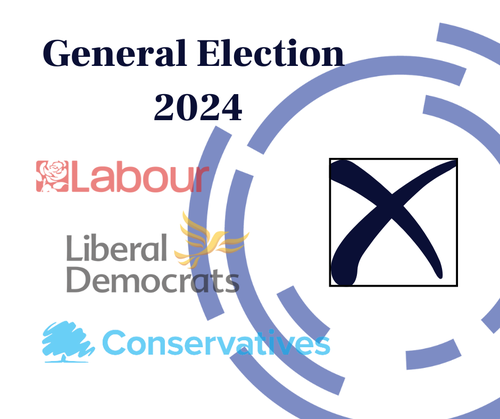General Election - A view from Helplines Partnership

As the election approaches, the Conservative, Liberal Democrat, and Labour parties have each released their manifestos, detailing their plans and policies for the future. For charities and the mental health sector, these manifestos hold significant implications, influencing funding, regulatory environments, and service delivery. We’ve given them a read so you don’t have to and we will briefly delve into how each party's manifesto could impact charities and the mental health sector.
Conservative Party Manifesto
Funding and Financial Support
The Conservative Party has pledged to maintain a strong commitment to the charitable sector, with a focus on financial sustainability. Their manifesto promises to increase funding for mental health services by an additional £1 billion per year by 2025, aiming to ensure better access and support for mental health services across the country. However, there is an emphasis on efficiency and value for money, with funding directed towards organisations that demonstrate high impact and effective use of resources.
Mental Health Services Expansion
The Conservatives propose expanding mental health services through a mix of increased funding and innovative approaches, such as integrating mental health care within schools and workplaces. They plan to train more mental health professionals and provide additional resources for early intervention programs, aiming to reduce the long-term impact of mental health issues.
Regulatory Changes and Governance
The manifesto includes plans to simplify the regulatory framework for charities, reducing administrative burdens and allowing them to focus more on service delivery. There is also a proposal to strengthen oversight and transparency to ensure that charitable funds are used effectively and ethically.
Liberal Democrat Party Manifesto
Funding and Financial Support
The Liberal Democrats are committed to significantly increasing investment in both the charitable and mental health sectors. Their manifesto outlines a plan to raise mental health spending by £2 billion a year, funded through targeted tax reforms. This funding aims to ensure parity of esteem between mental and physical health, with additional resources for preventive care and community-based services.
Mental Health Services Expansion
The Liberal Democrats propose a comprehensive mental health strategy that includes the integration of mental health services into primary care, increasing the availability of talking therapies, and establishing a 24/7 mental health crisis service. They also emphasise the importance of addressing mental health within schools and supporting young people through early intervention programs.
Regulatory Changes and Governance
To support charities, the Liberal Democrats plan to streamline the regulatory process and provide additional support for small and medium-sized charities. They also propose enhanced measures for transparency and accountability, ensuring that charities operate with integrity and public trust.
Labour Party Manifesto
Funding and Financial Support
The Labour Party promises a substantial increase in funding for the charitable and mental health sectors, with a commitment to invest an additional £2.5 billion annually in mental health services. This funding is intended to address long-standing underinvestment and ensure comprehensive support for mental health needs across the population. Labour also plans to introduce tax incentives for donations to charities, encouraging more public and corporate support.
Mental Health Services Expansion
Labour's manifesto includes a far-reaching plan to revolutionise mental health care, aiming to provide free mental health prescriptions and extend mental health services to be available within all GP surgeries. They propose a significant expansion of the mental health workforce, including hiring more counsellors and therapists, and ensuring that mental health support is available in every school.
Regulatory Changes and Governance
Labour plans to implement a robust regulatory framework that ensures charities are well-supported while maintaining high standards of accountability and transparency. They propose reducing unnecessary bureaucratic hurdles and providing additional training and resources for charity governance.
Conclusion
The manifestos of the Conservative, Liberal Democrat, and Labour parties each present distinct visions for the future of charities and the mental health sector. The Conservatives focus on efficiency and value for money, the Liberal Democrats emphasise significant investment and comprehensive integration of services, and Labour promises substantial funding increases and widespread availability of mental health support.
However, there is more information from each manifesto that would be helpful. We know that volunteering is the bedrock of many of your services so the lack of ambition or strategy for how any new Government can enhance the voluntary sector was disappointing. There is also no mention of support for the third sector in transitioning to net zero. With many organisations having clear commitments from their board to achieve this, we would have liked to see policy proposals that would specifically support charities so funding can be directed to frontline services.
For all of us, these policies will shape the landscape in which they operate. Staying informed about these political developments is crucial for adapting strategies, securing funding, and advocating for the needs of their beneficiaries.